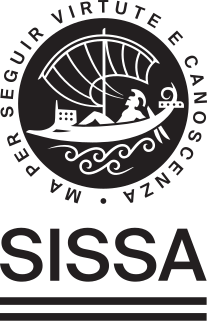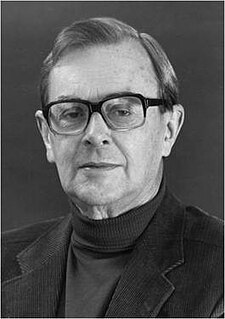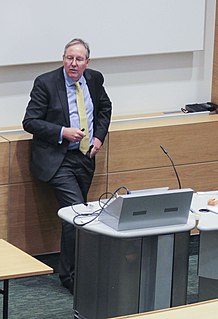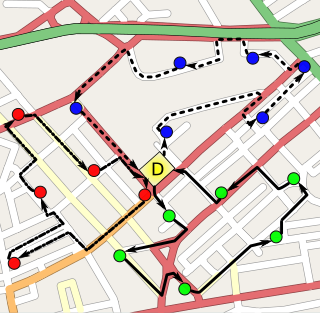Related Research Articles

Physics is the natural science that studies matter, its fundamental constituents, its motion and behavior through space and time, and the related entities of energy and force. Physics is one of the most fundamental scientific disciplines, with its main goal being to understand how the universe behaves.
The Royal Radar Establishment was a research centre in Malvern, Worcestershire in the United Kingdom. It was formed in 1953 as the Radar Research Establishment by the merger of the Air Ministry's Telecommunications Research Establishment (TRE) and the British Army's Radar Research and Development Establishment (RRDE). It was given its new name after a visit by Queen Elizabeth II in 1957. Both names were abbreviated to RRE. In 1976 the Signals Research and Development Establishment (SRDE), involved in communications research, joined the RRE to form the Royal Signals and Radar Establishment (RSRE).

Clare Hall is a constituent college of the University of Cambridge, England. Founded in 1966 by Clare College, Clare Hall is a college for advanced study, admitting only postgraduate students alongside postdoctoral researchers and fellows. It was established to serve as an Institute of Advanced Studies and has slowly grown and developed into a full constituent college.

Charles Thomson Rees Wilson, CH, FRS was a Scottish physicist and meteorologist who won the Nobel Prize in Physics for his invention of the cloud chamber.

The University of Science and Technology of China (USTC) is a public research university in Hefei, Anhui, China. The university is affiliated to the Chinese Academy of Sciences, and co-funded by the academy, the Ministry of Education, and the Anhui Provincial Government. It is a member of the elite C9 League. It is also a Chinese state Class A Double First Class University. Founded in Beijing by the CAS in September 1958, it was moved to Hefei in the beginning of 1970 during the Cultural Revolution.

The Government College University, Lahore is a public research university located in Lahore, Punjab, Pakistan. Opened as Government College, Lahore, in 1864, it became a university in 2002.
Computational science, also known as scientific computing or scientific computation (SC), is a field in mathematics that uses advanced computing capabilities to understand and solve complex problems. It is an area of science that spans many disciplines, but at its core, it involves the development of models and simulations to understand natural systems.

The Courant Institute of Mathematical Sciences is the mathematics research school of New York University (NYU), and is among the most prestigious mathematics schools and mathematical sciences research centers in the world. Founded in 1935, it is named after Richard Courant, one of the founders of the Courant Institute and also a mathematics professor at New York University from 1936 to 1972, and serves as a center for research and advanced training in computer science and mathematics. It is located on Gould Plaza next to the Stern School of Business and the economics department of the College of Arts and Science.

Mathematical psychology is an approach to psychological research that is based on mathematical modeling of perceptual, thought, cognitive and motor processes, and on the establishment of law-like rules that relate quantifiable stimulus characteristics with quantifiable behavior. The mathematical approach is used with the goal of deriving hypotheses that are more exact and thus yield stricter empirical validations. There are five major research areas in mathematical psychology: learning and memory, perception and psychophysics, choice and decision-making, language and thinking, and measurement and scaling.

The Scuola Internazionale Superiore di Studi Avanzati (SISSA) is an international, state-supported, post-graduate-education and research institute, located in Trieste, Italy.
A computer-assisted proof is a mathematical proof that has been at least partially generated by computer.
Athanassios Spyridon Fokas is a Greek mathematician, with degrees in Aeronautical Engineering and Medicine. Since 2002, he is Professor of Nonlinear Mathematical Science in the Department of Applied Mathematics and Theoretical Physics (DAMTP) at the University of Cambridge.
Raymond David Mindlin was an American mechanical engineer, Professor of Applied Science at Columbia University, and recipient of the 1946 Presidential Medal for Merit and many other awards and honours. He is known as mechanician, who made seminal contributions to many branches of applied mechanics, applied physics, and engineering sciences.

Sir Alfred Brian Pippard, FRS, was a British physicist. He was Cavendish Professor of Physics from 1971 until 1982 and an Honorary Fellow of Clare Hall, Cambridge, of which he was the first President.
Ekhard Karl Hermann Salje, FRS is Professor of Mineralogy and Petrology and former Head of the Department of Earth Sciences, Cambridge University.

Peter Brent Littlewood is a British physicist and Professor of Physics at the University of Chicago. He was the 12th Director of Argonne National Laboratory. He previously headed the Cavendish Laboratory as well as the Theory of Condensed Matter group and the Theoretical Physics Research department at Bell Laboratories.

Applied mathematics is the application of mathematical methods by different fields such as physics, engineering, medicine, biology, finance, business, computer science, and industry. Thus, applied mathematics is a combination of mathematical science and specialized knowledge. The term "applied mathematics" also describes the professional specialty in which mathematicians work on practical problems by formulating and studying mathematical models.
David Malcolm Potts is a professor of Analytical Soil Mechanics at Imperial College London and the head of the Geotechnics Section at Imperial College. He has been a member of the academic staff at Imperial College since 1979, responsible for teaching the use of analytical methods in geomechanics and the design of slopes and earth retaining structures, both at undergraduate and postgraduate levels.
Kevin Kendall FRS is a British physicist who received a London external BSc degree at Salford CAT in 1965 while working as an engineering apprentice at Joseph Lucas Gas Turbine Ltd. He became interested in surface science during his Ph.D. study in the Cavendish Laboratory and devised a novel method for measuring the true contact area between solids using an ultrasonic transmission. That led to new arguments about the adhesion of contacting solids, giving a theory of adhesion and fracture that applies to a wide range of problems of high industrial significance, especially in the chemical industry where fine particles stick together tenaciously. His book Crack Control published by Elsevier summarizes many of these applications.
References
- ↑ "Dr Ken Riley - Clare College Cambridge". www.clare.cam.ac.uk. Retrieved 2022-05-08.
- ↑ "200 Puzzling Physics Problems - Peter Gnadig, Gyula Honyek, Ken Riley". www.iri.upc.edu. Retrieved 2022-05-08.
- ↑ "Mathematical Methods for Physics and Engineering" (PDF). Retrieved 2022-05-08.